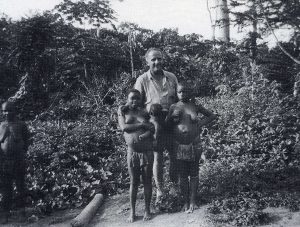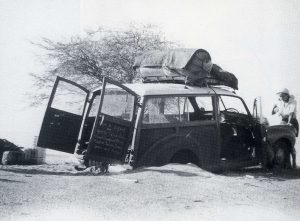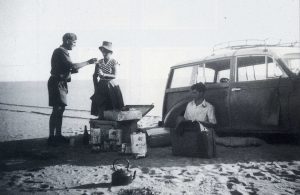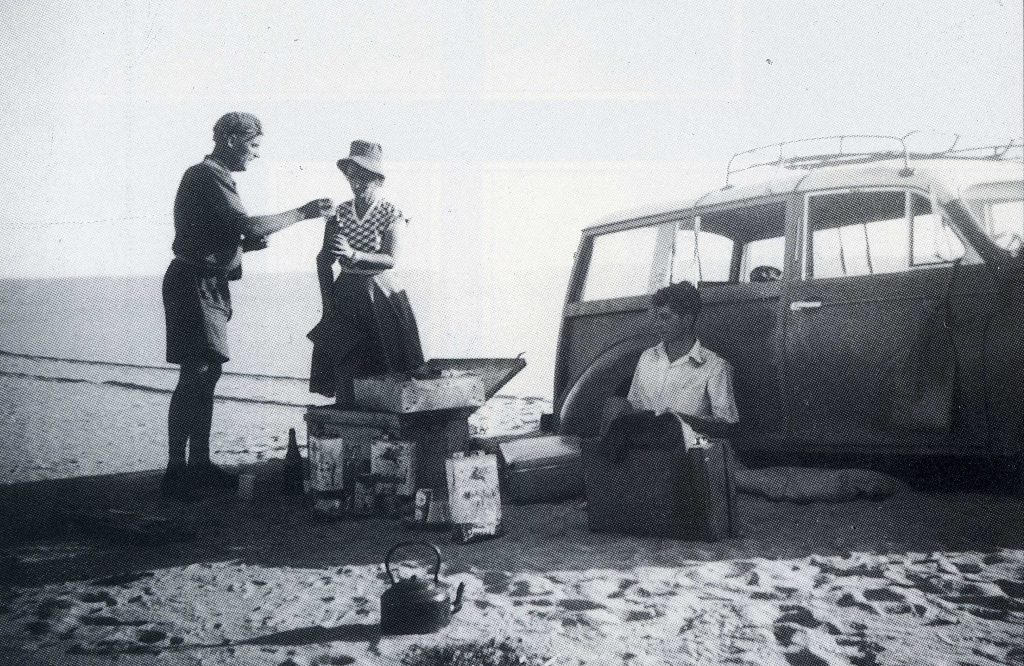
Sixty years ago this month a failed Kenyan coffee planter and three associates set out from Nairobi in a Morris Traveller to drive across Africa, through the Sahara Desert and Europe to London. The poorly planned expedition was to end in failure and the death of Alan ‘Sweetie’ Cooper (East 1926).
Cooper headed to Kenya soon after leaving Cranleigh in 1925. At the school he was regarded as lazy and someone who had little time for authority. One contemporary recalled how he held the record for punishment drills in the Quad, often seeming to be there every afternoon for weeks.
Farming in Kenya was tough and Cooper only just kept his head above water. In 1933 he decided to visit home and to save money drove a 1931 8hp Morris Minor across Africa and Europe. The Times reported the trip, commenting he had driven the 800 miles across the Sahara in four days.
He returned to his farming life in Kenya but always struggled. He did not help himself, devoting more time to tennis and parties than he did to his business. In 1955 he decided to repeat the journey of 22 years earlier to travel home to see his ageing mother.
He found three unlikely paying companions by placing an advertisement in the East African Standard. Barbara Duthey (40) was a zoologist working in Kenya; Freda Taylor (50) was an English schoolteacher on sabbatical who had been on safari and wanted to see the Sahara on her way home. Peter Barnes (17) whose mother wanted his outlook on life broadened, thought this was a good way to see his grandparents in England. They each paid Cooper £175.

Despite his previous experience, Cooper’s preparations were almost non-existent, although that rather typified a man who preferred leisure to the tedium of plans and details. The car was not equipped for the rigours ahead, with the only concession to the conditions expected being that the roof was painted white to protect against the sun. Cooper took only one spare tyre, one spare inner tube and carried ten gallons of water as opposed to the recommended minimum of 40. He also had few spares. The passengers had been promised they would be accompanied by a truck and two Africans to do all the day-to-day work. That never materialised.
The trip, which began on April 5, 1955, started uneventfully and the four successfully crossed Kenya (at the time at the height of the Mau Mau uprising), Uganda, the Belgian Congo and French Equatorial Africa, spending nights in government rest homes. After a minor accident in Cameroon, they set off across the Sahara Desert, following a line of oil drums placed every half mile alongside the tracks of pervious vehicles.
Within hours the car became stuck in sand an irritating situation was rendered far more serious as Cooper had not brought spades. Almost as soon as they managed to free the vehicle by manual digging with anything they could find, it again sank into the sand. By the time they had gone less than 60 miles into the desert they were almost out of water and completely bogged down. At that point Cooper took the foolhardy decision to walk and get help. In a featureless desert, he relied on following the oil drums.
The remaining three eventually freed the car after hours of exhausting work and, dumping as much luggage as they could to reduce the weight, resumed. Still they were regularly stuck, but the next day Cooper reappeared on board an Algerian truck that had picked him up. The heat had affected him badly and he lurched in and out of consciousness.

Cooper was persuaded to let the group return in convoy with the lorry and another vehicle following it to In Guzzan to pick up supplies before trying again. Duthey decided to go with the lorry, but en route the other three lost the convoy and almost inevitably they again became stuck, this time with little hope of getting out. With no water other than what was in the radiator, the trio made a shelter from a tarpaulin and waited in the hope someone might stumble across them.
Cooper, exhausted from his earlier walk, died a slow death and an exhausted Taylor followed two days later, leaving Barnes alone. He was found semi-conscious by a French Foreign Legion patrol who had been alerted by nomads who had spotted the car headlights which he had been occasionally flashing. After three weeks in hospital he was able to resume his journey to London. Barnes and Duthey both still live in Kenya.
The story was later documented in a book, Trek, by Paul Stewart (Jonathan Cape 1991).

